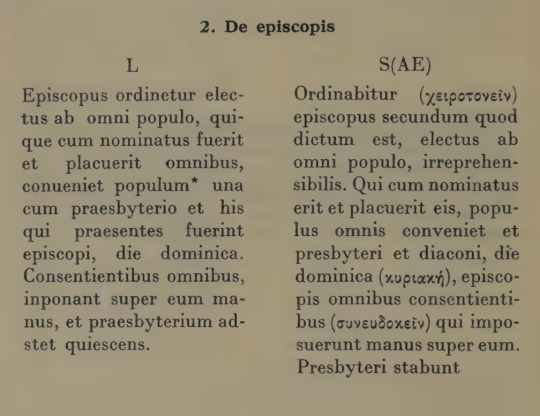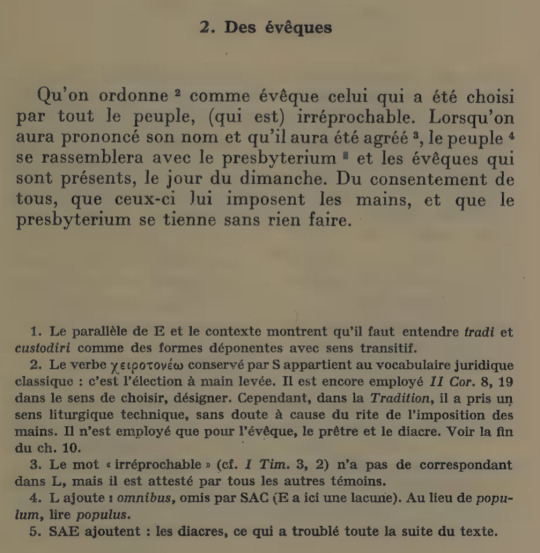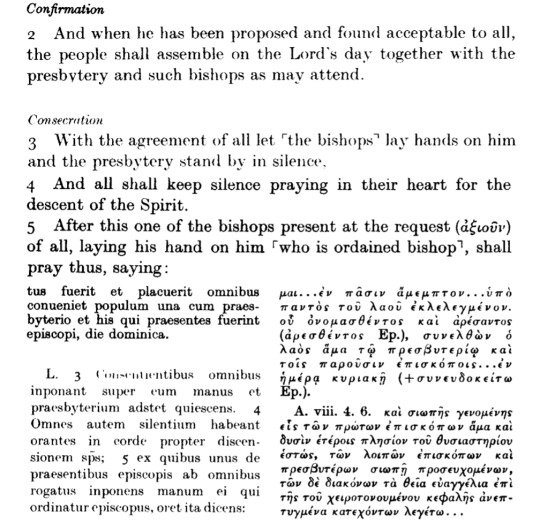#ch: irene bishop
Text
triggered by the Amars calling succession to the Presidency by Cabinet officers, rather than the House Speaker, “apostolic succession”
the succession to Rome is by election of the College of Cardinals??? it doesn’t just go to the favorite of the last Pontifex???
sure, Christ picked the Apostles, and the Apostles picked the bishops for particular seats, cf. Tertull. Praescr. Haer. 32; Iren. Adv. Haer. 3.3.1, but ever since the proper succession to any particular seat has been by election
see, e.g., Jerome, Dialogue Against the Luciferians, ch. 11 (translated by Peter Norton, Episcopal Elections, 250–600: Hierarchy and Popular Will in Late Antiquity (Oxford, 2007), 5):
The truth is, the men who are elected to the episcopate come from the
bosom of Plato and Aristophanes. How many can you find among them who are not fully versed in these writers? Indeed everyone, whoever he may be,
is ordained at the present day from among the literate class and makes it his
study not how to seek out the marrow of Scripture, but how to tickle the ears
of the people with the flowers of rhetoric.
Cyprian, Ep. 55.8.4 (Norton 13):
Cornelius was made bishop by the
judgment of God and his Christ; by the testimony of almost all the
clergy; by the vote of all the people who were present [de plebis quae tunc adfuit suffragio],
and by the committee of senior bishops and good men.
cf. Cyprian, Ep. 67.3 (Norton 15):
the people definitely has the power either to choose worthy
bishops or to reject unworthy ones [quando ipsa <plebs> maxime habeat potestatem vel eligendi dignos
sacerdotes vel indignos recusandi]
Ambrose, Ep. 63.2 (Norton 13):
rightly it is believed that
he whom all have asked for [as bishop] is chosen by the judgment
of God [merito creditum quod divino esset electus iudicio, quem omnes postulavissent]
Apostolic Constitutions 8.4.2 (Norton 24):
and so, I, Peter say that a bishop to be ordained is to be, as we have all already
commanded, without blame in all respects; a chosen person, picked by the
whole people; and when he is named and approved, let the people assemble,
with the presbyters and bishops that are present, on the Lord’s day; and let
them give their consent. And let the principal of the bishops ask the presbytery and people whether this is the person whom they desire as their ruler.
And if they agree, let the bishop ask further whether he has a good testimony
from all men as to his worthiness for such a great and glorious authority;
whether all things relating to his piety towards God be right; whether justice
towards men has been observed by him; whether the affairs of his family
have been well-managed by him; whether he has been irreproachable in the
course of his life.
And if all the assembly together act according to truth, and
not according to prejudice, and witness that he is such a one, let them the
third time, as before God the Judge, and Christ, the Holy Ghost being also
present, as well as all the holy and ministering spirits, ask again whether he be
truly worthy of this ministry, so that in the mouth of two or three witnesses
every word may be established.
And if they agree the third time that he is
worthy, let all be asked for their vote; and when they all give it willingly, let
them be heard.
And then, after order has been called, being made, let one of
the principal bishops, together with two others, stand near together, the rest
of the bishops and presbyters praying silently, and the deacons holding the
divine Gospels open upon the head of him that is to be ordained.
Leo, Ep. 10.6 (Norton 38):
Let he
who is to be in charge of everybody be chosen by everybody. [Qui praefuturus omnibus est, ab omnibus eligatur.]
Leo, Ep. 14.5 (Norton 43):
When it comes to the choice of a bishop, let him be installed whom with
harmonious agreement the clergy and people have requested; and where
the votes of the parties are split among diVerent candidates, the future
bishop will be he who, in the metropolitan’s judgment, is more deserving
and has greater support, so that no bishop is ordained to those who do
not want him or who have not requested him; and so no city which is not
allowed to have the bishop it wanted will either despise or hate an
unwanted bishop, and become less pious than is proper.
[Cum ergo de summi sacerdotis electione tractabitur, ille omnibus praeponatur
quem cleri plebisque consensus concorditer postularit; ita ut si in aliam forte
personam partium se vota diviserit, metropolitani iudicio praefuturus qui
majoribus et studiis iuvatur et meritis: tantum ut nullus invitis et non petentibus ordinetur, ne civitas episcopum non optatum aut contemnerit aut oderit;
et fiat minus religiosa quam convenit, cui non licuerit habere quem voluit.]
Cod. Iust. 1.3.41 (Norton 34):
with this law we ordain that whenever
in any city there should be a vacancy for the bishop’s throne,
the inhabitants should make a resolution concerning three candidates, men of sound faith and pious habits . . .
so that from these the most suitable might be promoted to the
bishopric.
apparently Gratian helped kill the tradition by mangling a letter from Pope Celestine, dated 428. see Kenneth Pennington, The Golden Age of Episcopal Elections, 1100–1300, 35 Bull. Medieval Canon L. 243 (2017)
Celestine’s letter originally read:
No bishop should be given to an unwilling flock. The consent and desires of the clergy, laymen, and senate are required.
[Nullus invitis detur episcopus; cleri, plebis et ordinis consensus et desiderium requiratur.]
but Gratian edited that down to its final sentence, and extracted from it the black-letter rule that “the people don’t elect their bishop”:
The people do not elect [their bishop], but consent to the election.
[Plebi non est eligere, set electioni consentire.]
The consent and desires of the clergy and people are required.
[Cleri plebis consensus et desiderium requiratur.]
that isn't what it says, Gratian!
contra, e.g., Lumen Gentium 3.20–22, which reads the Fathers for all they’re worth and, not finding its own doctrine in them, cites to them with a “cf”, and even has the guff to cite the Apostolic Tradition (ca. 215), which reads, in Botte’s edition:


and in Dix’s edition:


Romish guy, wise: “electus ab omni populo”? “consentientibus omnibus”? what could that possibly mean? ....... probably means the Pope picks them ......
it's an election, dumbass!
8 notes
·
View notes
Photo

crown the ravens who paint the sky - a wip introcuction
Excerpt:
When the trees bleed mist, and the jagged branches on the trees silhouette jagged shapes into the sky, I get on my knees and pray, in a church made of concrete and glass, the graveyard watching through the shattered window, the world stained blue and green.
On the wall, white hot iron digging into their hands and the back of their mouth and through the exposed bone of their shins, all their skin peeled off until they’re only a mass of flesh that had once pretended to be a human, is a young fae. They fill the air with the smell of flowers and burning flesh and mountain air, descendant of the goddess that so many search, caught, like a broken butterfly on a corkboard.
They gasp for breath that isn’t theirs, rasp out words that don’t belong to them but that they’ve stolen, no name of their own to claim so they take and take and take, the never ending desperation that comes from the hunger their magic induces.
“Welcome, fellow daughter of these woods,” they rasp. “What wisdom do you seek.”
Genre: Forestpunk, low industrial fantasy, litfic? (It used to be so much more fantasy-ish and now it’s very much a character study but it still has fantasy elements and stuff, so take it as you will)
pinterest - tag
Summary:
One hundred years ago, Sithau refused to be conquered. Now it pays the price. Factories grow from soiled ground, iron statuettes drill for oil, mines defile what used to be sacred mountains. One hundred years ago, whatever hides in the woods drained the life and sanity from whoever dared lay hands on Sithau’s treasures. Soldiers were found, hundreds of years old when they were merely men just the day before. Other found wild eyed and feral, clawing at whatever dared come near, muttering about faeries and a desperate craving to be human. One hundred years ago, something protected Sithau.
When the bodies of two students at the local military academy are found, rumours begin to flourish, claiming the deaths resembled those that occurred all those years ago. Whatever protected Sithau one hundred years ago could be back, which means for some people in Sithau, it’s time to kill a goddess.
Themes: violation, humans as religion, what makes a monster, coming of age, rebellion, generational trauma, nature vs. nurture, humanity, the quest for power, how far will anyone go to achieve their dreams, exploitation, humanity
Aesthetic: whispered prayers to forgotten gods, winding mountain roads shrouded in mist, branches carving a jagged silhouette in the sky, a white blouse coloured red with blood that isn’t yours, fog, abandoned warehouses reclaimed by feral woods, flashes of white in the foliage that could be bones, but you don’t want to look, wrought iron gates leading nowhere, ancient bitter things lurking behind the eyes of the youth, cigarette smoke trailing against a cloudy sky, books left behind by someone who loved them, words pencilled into trees so long ago they’re no longer legible, gods hiding round the bend, drunks warning you of the things hiding in the woods and between the intentions of the townsfolk, water-stained splashes of ink on crumpled paper, dried flowers pressed between pages, the wind telling you secrets you’ll never hear, the birds going silent all at once, gaping mouths and rusted nails
Characters:
sofiya mikhailova hears the whispers of unholy gods and the power to craft reality to her will roils through her veins. flowers bloom under her feet and wither as soon as she steps away, the world is hers to command. left to die in the woods as an infant, the woods should have killed her, but whatever happened in those woods proves sofiya mikhailova isn’t human.
[eldest daughter complex - ripped apart with anger - exists in the limbo between past and present - tempest of emotion locked away - feels too much and has decided to thus feel nothing - hollow - painful - bitter - built from a wild sea and an even wilder sky]
ayse terzi is the only good thing that’s ever come out of sithau, her dresses coloured blue and red like the bruises she inflicts without meaning to, she doesn’t belong here, deserves some place better, but sithau is what she has and she’s good enough to want to influence her world: make sithau better, make sithau kinder, as if that’s something that can be achieved.
[convinced she’s always right and it destroys all the people she’s trying to protect - too young to be this old - so tired of being the mother but doesn’t know how to do anything else - less soft than she looks - less kind than she thinks she is - cares too much about your opinion - fabricated from silk and silver]
irene bishop was fire in human form. fury and gaunt eyes and bloody fists. she protected secrets she didn’t understand, wallowed in her need for revenge, and if she had her way, all those who ever dared think of harming anyone she loved would be dead. she smiled with broken teeth, hollow bones ready to take flight, autumn colours in a raging inferno.
[burn scars and hatred - blind devotion - petty squabbles - repression and refusal to be someone she’s not - could kill you but doesn’t - all sharp edges - dead inside and out - breaking apart - a walking catastrophe - six feet under - can’t be happy - wants to be happy - wants to make everyone happy]
halisi athiambo sees the world in a way she can show no other. machinery speaks to her in a way no human can, and in turn, she creates wonders, for the small price of a soul. colours bleed from her mind when she’s thinking, fireworks spark and ideas flow and what she wants to create now might just be what pushes her over the brink.
[inquisitive - yearning - mind soars through the air - nihilistic - warm and lovely and everything and nothing - bleeds machinery - sees terror and is not impressed - laughter and creation - has outgrown her own depression so she’s given it away - cobbled together from dreams and invention]
romeo beauregarde is bred from old money and older gods, the power behind his name the kind others can only dream of wielding. but he doesn’t know how to use it, coddled and loved to the point of incompetence, softened where everyone else has been hurt, but his heart is too warm and too big and too open and he’ll only hurt himself in the end.
[golden boy and golden heart - means well - should have grown up by now - passionate about what others love - formed by what others want - never good enough - bedroom eyes and soft lips - they call him whore behind his back - warm hugs and ruffled hair - shouldn’t be a part of this - where are his scars - money dripping from his fingers and mouth, pooling at his feet]
Taglist (send an ask to be added/removed): @semblanche @bulletgirl @crystallized-ink @theaestheticarmchair @erinnharper @lord-fallen @pen-for-sword @howdy-writes @reininginthefirewriting @surroundedbypearls
General Taglist (send an ask to be added or removed): @saintsjoan @andiwriteunderthemoon @fablemancy
#wip introduction#writeblr#writers of tumblr#writing#writer#wip: crown the ravens who paint the sky#ch: sofiya mikhailova#ch: halisi athiambo#ch: romeo beauregarde#ch: irene bishop#ch: ayse terzi#salem.writing#wip#writing wip
161 notes
·
View notes
Photo





Characters from Crown the Ravens, made using this picrew:
from top to bottom, left to right:
Romeo Beauregarde IV / Halisi Athiambo
Sofiya Mikhailova / Ayse Terzi / Irene Bishop
Taglist (send an ask to be added/removed): @semblanche @bulletgirl @crystallized-ink @theaestheticarmchair @erinnharper @lord-fallen @pen-for-sword @howdy-writes @reininginthefirewriting @surroundedbypearls @meadowclarke @analogued @blindthewind @ashen-crest
General Taglist (send an ask to be added/removed): @saintsjoan @andiwriteunderthemoon @fablemancy @perditism
#ch: romeo beauregarde#ch: halisi athiambo#ch: sofiya mikhailova#wip: crown the ravens who paint the sky#ch: ayse terzi#ch: irene bishop#salem.writing
21 notes
·
View notes